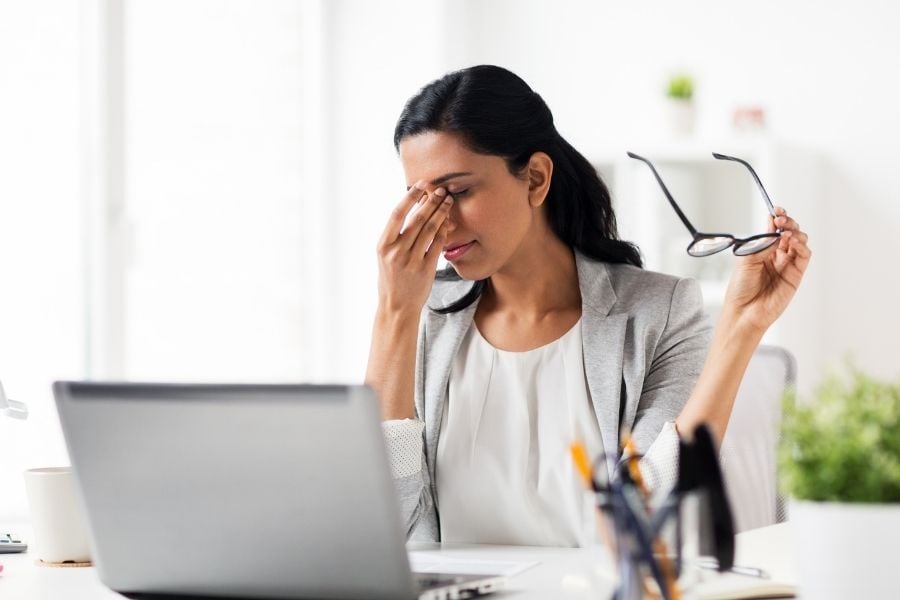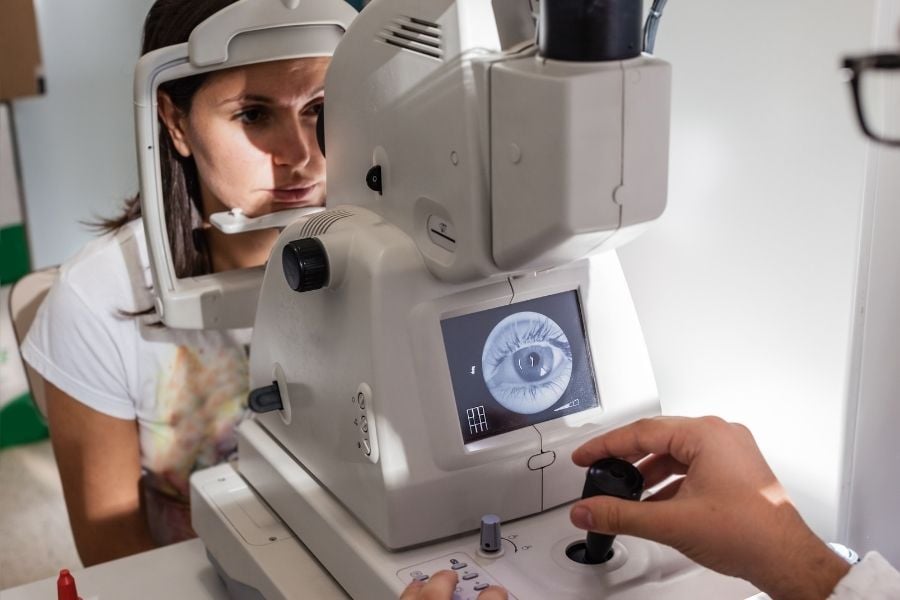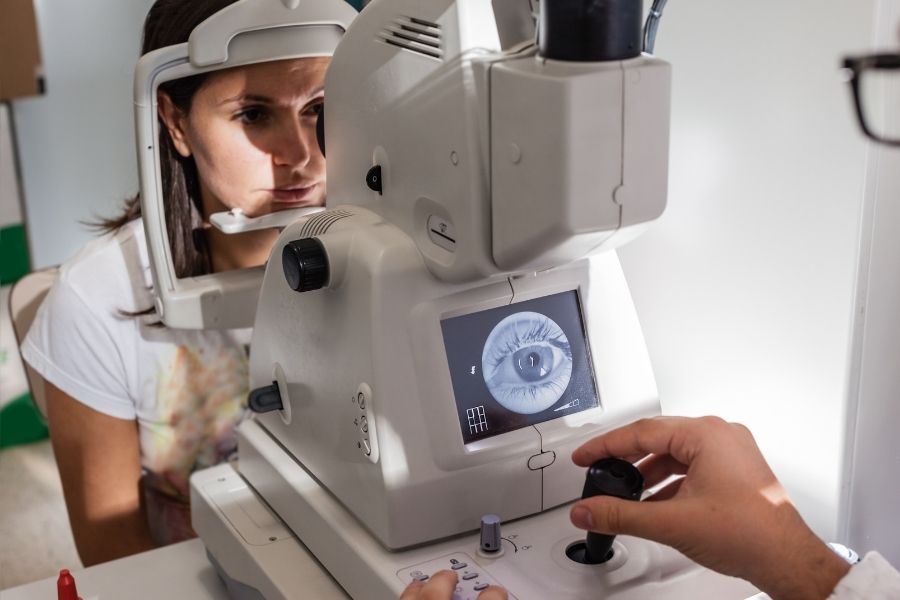The symptoms of dry eyes are unpleasant, to say the least. Our eyes are the windows through which we view life, so it goes without saying that redness, itchiness, and blurry vision can put a damper on our day-to-day experience.
Dry eyes are becoming more common with the increasing amount of time we spend looking at screens. Be it a cell phone, tablet, laptop or desktop monitor, screen time reduces how often we blink and in turn, increases our chance of developing symptoms. We sat down with Andrew Liang, our Optometrist, to hear more about the top dry eye causes and why preventative steps are so essential when it comes to your vision.

Types of Dry Eyes
Before discussing the causes of dry eye symptoms, it’s important to point out that there are different types of dry eyes in the first place. Put simply, dry eyes are related to the tears (or lack of tears) your eyes produce.
“The tears in your eyes are composed of two main layers,” explains Andrew. “One is water, known as aqueous, and the other is oils, known as lipids.” Dry eyes can lack one or both of these layers, but in most cases, it’s the lipid layer that’s missing.
People can experience dry symptoms for a variety of reasons. Sometimes they present themselves after LASIK eye surgery, but this usually isn’t directly related to the oil glands in the eyes. You can also experience dry eyes due to excess or improper contact lens use, he notes, which is why it’s always important to have your contacts properly fitted.
Certain diseases, such as Sjogren's syndrome, can cause dry eyes as a result of a decrease in the aqueous (or water) layer of the tears. And certain drugs, such as antihistamines and antidepressants, can cause dry eye symptoms as a side effect as well.
As an Optometrist, these are 4 of the 5 main causes of dry eye symptoms that Andrew sees in patients. Above all else, though, the #1 cause he sees most frequently comes down to blinking–or rather, a lack of it.
Screen Time and Dry Eye Symptoms
So, what exactly is the link between screen use and dry eye symptoms? “The reason is because of the oil glands found in your eyelids, known as the Meibomian glands,” Andrew shares. “They produce oil, but for the oil to come out, you need to blink your eyes.”
Blinking your eyes expresses oil and helps keep your eyes lubricated. But doing tasks where our eyes are fixated on one thing for a long period of time–like looking at screens or even reading a really good novel – causes us to blink less frequently. We often don't realize that we aren’t blinking enough. For many of us, however, this is part of our daily reality.
This lack of blinking from looking at screens causes oils to form, but not be secreted. When oil becomes stagnant for too long, it starts to solidify, which can form a catch near the opening and prevent other oils from coming out. “That’s the main reason we see dry eyes at our clinic,” Andrew says.

What Is Dry Eye Disease?
Like we already alluded to, dry eye disease is anything but pleasant. Some of the most common symptoms include having red, itchy, watery eyes, sensitivity to light, blurry vision, or any stinging or scratching sensations. These can be mild or severe and have a considerable impact on your day-to-day.
In cases of Meibomian Gland dysfunction (or a lack of oil produced in the eye), patients can have different severity levels. To help identify how bad the blockages are, Andrew uses a technique where he pushes along the lower lid of the eye. “In this case, I’m expecting a liquid oil coming out,” he explains, “but in really bad cases it comes out looking like toothpaste or sometimes not at all. That’s essentially telling me I need to take a closer look at these glands to see what’s going on.”
Dry eyes can also be so severe that they cause the Meibomian glands to die off. Typically, this is the result of them being clogged for too long or if the blockages in the glands are too deep. Everyone should be aware of this risk because once the glands die off, they cannot grow back. A patient with Meibomian glands that have died off will experience more severe dry eye symptoms that can also end up being quite costly.
This reason alone showcases why routine eye exams are such an important step when it comes to preventative eye health. Regular check-ins can help detect and stop any potential issues from getting worse that could eventually cause irreversible damage to your vision. Book an eye exam at HealthOne to get started!
Tips For Preventing Dry Eyes
If you aren’t experiencing symptoms yet, it’s never too early to adopt healthy and preventative habits. Screens aren’t going anywhere soon, so what advice does Andrew have for his patients?
“Taking frequent breaks is a must,” he emphasizes, “because studies show our blink rate decreases in quality and quantity in front of a screen.” He recommends setting a phone alarm every 30-40 minutes while you work to remind you to take a break. Try to look at something distant—like out a window or down a hallway, for example, to give your eyes a much-needed rest from concentrating so hard.
He also recommends doing a forced blink between 10 and 15 times when you’re taking a break from screen time. Even if it feels a little silly, it’s one simple way you can keep your peepers properly lubricated and functioning well. After all, about 80% of what we learn is visual!
Dry eye symptoms often result from too much screen time, and they can show up at any point in life. Symptoms usually start in the population that’s still working, Andrew says, and usually gets worse the older you get if left untreated. “It’s more likely to become problematic as you get older because the longer you’re exposed to a certain environment, the more likely it is to become an issue. Furthermore, some of the glands naturally degrade with age.”
For instance, a 40-year-old who has been looking at computer screens for most of their life is more likely to have dry eye symptoms than a 13-year-old who has only owned a smartphone for a couple of years. (We covered 3 signs you might need a social media detox in our previous blog post!) If that same teen looks at screens for 12-15 hours a day for the next 10 years of their life, the chances of them developing dry eyes would become much higher.
Taking a real, unbiased look at how often you look at screens today can help you make smarter choices that you’ll thank yourself for in the future.

Why You Should Visit an Optometrist?
Frequent breaks and forced blinks are essential, but an equally important part of your complete approach to eye care is regularly visiting your Optometrist. Even if you aren’t experiencing problems with your vision, eye exams can give you peace of mind that no underlying issues or health problems are developing that you don’t know about.
It's even more important to schedule an eye exam if you do experience uncomfortable symptoms, such as redness, itchy eyes, or blurry vision. Even headaches happening more frequently can be an indication of more going on beneath the surface, so make sure to discuss these changes with your provider.
Andrew recommends that his patients between the ages of 20 and 60 come in for a routine eye exam every 2 years. Kids 19 and under should come in every year, and adults over 60 should come back annually as well. We offer eye exams for both children and adults at our HealthOne Optometry clinic. Regular eye exams are a small commitment you can make throughout your life that will save you time and money in the future!
Here at HealthOne, there’s more to Andrew’s daily work than routine eye exams and dry eye treatment. With every patient, his goal is to provide an exceptional experience where he can not only help them but also educate them on their journey to optimal ocular health.
So many of us take our vision for granted when in reality we should be thankful for it every day! Our eyes are the windows to the world around us, so we should all be taking preventative steps to preserve our quality of vision for as long as we can.
You can visit our clinic to become a patient and learn more about how to prevent dry eyes. We look forward to caring for your vision and providing you with an informative, supportive, and ultimately unmatched experience.
One life. Live Inspired.


